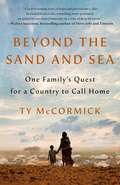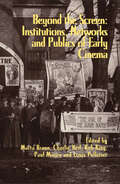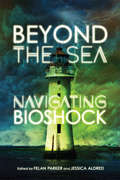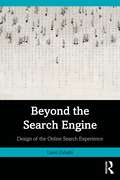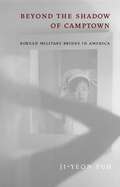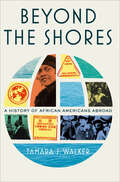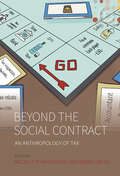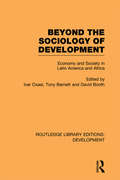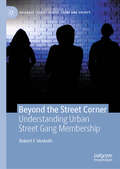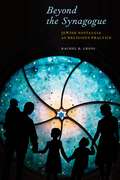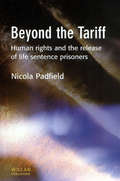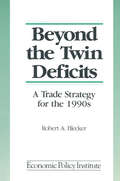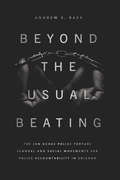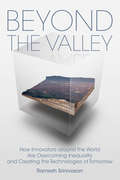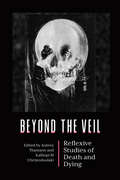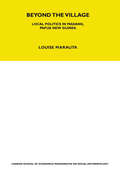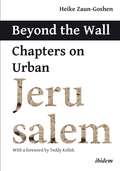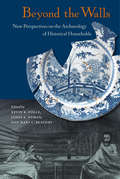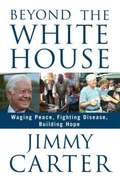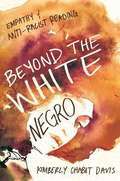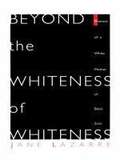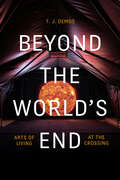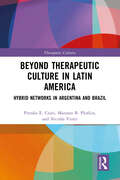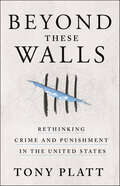- Table View
- List View
Beyond the Sand and Sea: One Family's Quest for a Country to Call Home
by Ty McCormickFrom Ty McCormick, winner of the Robert F. Kennedy Journalism Award, an epic and timeless story of a family in search of safety, security, and a place to call home.When Asad Hussein was growing up in the world’s largest refugee camp, nearly every aspect of life revolved around getting to America—a distant land where anything was possible. Thousands of displaced families like his were whisked away to the United States in the mid-2000s, leaving the dusty encampment in northeastern Kenya for new lives in suburban America. When Asad was nine, his older sister Maryan was resettled in Arizona, but Asad, his parents, and his other siblings were left behind. In the years they waited to join her, Asad found refuge in dog-eared novels donated by American charities, many of them written by immigrants who had come to the United States from poor and war-torn countries. Maryan nourished his dreams of someday writing such novels, but it would be another fourteen years before he set foot in America.The story of Asad, Maryan, and their family’s escape from Dadaab refugee camp is one of perseverance in the face of overwhelming adversity. It is also a story of happenstance, of long odds and impossibly good luck, and of uncommon generosity. In a world where too many young men are forced to make dangerous sea crossings in search of work, are recruited into extremist groups, and die at the hands of brutal security forces, Asad not only made it to the United States to join Maryan, but won a scholarship to study literature at Princeton—the first person born in Dadaab ever admitted to the prestigious university.Beyond the Sand and Sea is an extraordinary and inspiring book for anyone searching for pinpricks of light in the darkness. Meticulously reported over three years, it reveals the strength of a family of Somali refugees who never lost faith in America—and exposes the broken refugee resettlement system that kept that family trapped for more than two decades and has turned millions into permanent exiles.
Beyond the Screen: Institutions, Networks, and Publics of Early Cinema
by Marta Braun, Charlie Keil, Rob King, Paul Moore and Louis PelletierThis scholarly anthology presents a new framework for understanding early cinema through its usage outside the realm of entertainment.From its earliest origins until the beginning of the twentieth century, cinema provided widespread access to remote parts of the globe and immediate reports on important events. Reaching beyond the nickelodeon theatres, cinema became part of numerous institutions, from churches and schools to department stores and charitable organizations.Then, in 1915, the Supreme Court declared moviemaking a “busines, pure and simple,” entrenching the film industry’s role as a producer of “harmless entertainment.” In Beyond the Screen, contributors shed light on how pre-1915 cinema defined itself through institutional interconnections and publics interested in science, education, religious uplift, labor organizing, and more.
Beyond the Sea: Navigating Bioshock
by Felan Parker Jessica AldredThe Bioshock series looms large in the industry and culture of video games for its ambitious incorporation of high-minded philosophical questions and retro-futuristic aesthetics into the ultraviolent first-person shooter genre. Beyond the Sea marks ten years since the release of the original game with an interdisciplinary collection of essays on Bioshock, Bioshock 2, and Bioshock Infinite. <p><p> Simultaneously lauded as landmarks in the artistic growth of the medium and criticized for their compromised vision and politics, the Bioshock games have been the subject of significant scholarly and critical discussion. Moving past well-trodden debates, Beyond the Sea broadens the conversation by putting video games in dialogue with a diverse range of other disciplines and cultural forms, from parenting psychology to post-humanism, from Thomas Pynchon to German expressionist cinema. <p> Offering bold new perspectives on a canonical series, Beyond the Sea is a timely contribution to our understanding of the aesthetics, the industry, and the culture of video games. <p> Contributors include Daniel Ante-Contreras (Miracosta), Luke Arnott (Western Ontario), Betsy Brey (Waterloo), Patrick Brown (Iowa), Michael Fuchs (Graz), Jamie Henthorn (Catawba), Brendan Keogh (Queensland), Cameron Kunzelman (Georgia), Cody Mejeur (Michigan State), Matthew Thomas Payne (Notre Dame), Gareth Schott (Waikato), Karen Schrier (Marist), Sarah Stang (York/Ryerson), Sarah Thorne (Carleton), John Vanderhoef (California State, Dominguez Hills), Matthew Wysocki (Flagler), Jordan R. Youngblood (Eastern Connecticut State), and Sarah Zaidan (Emerson).
Beyond the Search Engine: Design of the Online Search Experience
by Liese ZahabiFocusing on the user experience of online search, this book explores the complex design at play and the ways social media platforms, websites, and other online interfaces have been created to provide information. Author Liese Zahabi addresses three key questions. How do users perceive search engines and what is their understanding of how they work? What are the various user interface designs, contemporary and historical, that have created access points to search, and how do these interfaces affect each other and a user’s search process? What do these designs and products say about our priorities and our relationships with information and other people? This book weaves archival and contemporary examples of interface designs together with the results of user research conducted by the author. These user studies focus on how people utilize various platforms, apps, and interfaces in their quest for information, answers, and meaning. Current research from the fields of user experience design, interaction design, and information design is integrated throughout to expand on these ideas and provide larger takeaways.This book is crucial reading for advanced students, scholars, and professionals in the fields of design (specifically user experience and interaction design), media and cultural studies, information science, and design studies.
Beyond the Shadow of Camptown: Korean Military Brides in America (Nation of Nations #25)
by Ji-Yeon YuhExplores the experiences of Korean military brides in the United StatesSince the beginning of the Korean War in 1950, nearly 100,000 Korean women have immigrated to the United States as the wives of American soldiers. Based on extensive oral interviews and archival research, Beyond the Shadow of Camptown tells the stories of these women, from their presumed association with U.S. military camptowns and prostitution to their struggles within the intercultural families they create in the United States. Historian Ji-Yeon Yuh argues that military brides are a unique prism through which to view cultural and social contact between Korea and the U.S. After placing these women within the context of Korean-U.S. relations and the legacies of both Japanese and U.S. colonialism vis á vis military prostitution, Yuh goes on to explore their lives, their coping strategies with their new families, and their relationships with their Korean families and homeland. Topics range from the personal—the role of food in their lives—to the communal—the efforts of military wives to form support groups that enable them to affirm Korean identity that both American and Koreans would deny them. Relayed with warmth and compassion, this is the first in-depth study of Korean military brides, and is a groundbreaking contribution to Asian American, women's, and "new" immigrant studies, while also providing a unique approach to military history.
Beyond the Shores: A History of African Americans Abroad
by Tamara J. WalkerAn award-winning author charts the poignant global journeys of African Americans as she explores her own transatlantic family odyssey in this powerful history of living abroad while Black. &“By exploring the life of Black expats, creatives, and activists, Tamara J. Walker enhances the stories of migration to reveal how race is lived in the United States and abroad.&”—Marcia Chatelain, Pulitzer Prize–winning author of South Side GirlsPart historical exploration, part travel memoir, Beyond the Shores reveals poignant histories of a diverse group of African Americans who have left the United States over the course of the past century. Together, the interwoven stories highlight African Americans&’ complicated relationship to the United States and the world at large. Beyond the Shores is not just about where African Americans stayed or where they ate when they traveled but also about why they left in the first place and how they were treated once they reached their destinations. Drawing on years of research, Dr. Tamara J. Walker chronicles their experiences in atmospheric detail, taking readers from well-known capital cities to more unusual destinations like Yangiyul, Uzbekistan, and Kabondo, Kenya. She follows Florence Mills, the would-be Josephine Baker of her day, in Paris, and Richard Wright, the author turned actor and filmmaker, in Buenos Aires. She relays tender stories of adventurous travelers, including a group of gifted Black crop scientists in the 1930s, a housewife searching for purpose in the 1950s, a Peace Corps volunteer discovering his identity in the 1970s, and her own grandfather, who, after losing his eye fighting in World War II and returning to a country that showed no signs of honoring his sacrifice, set out with his wife and children on a circuitous journey that sent them back and forth across the Atlantic. Tying these tales together is Walker&’s personal account of her family&’s, and her own, experiences abroad—in France, Brazil, Argentina, Austria, and beyond. By sharing the accounts of those who escaped the racism of the United States to try their hands at life abroad, Beyond the Shores shines a light on the meaning of home and the search for a better life.
Beyond the Social Contract: An Anthropology of Tax (Studies in Social Analysis #15)
by Nicolette Makovicky and Robin SmithTax and taxation are conventionally understood as the embodiment of social contract. This ground-breaking collection of essays challenges this truism, examining what tax might tell us about the limits of social-contract thinking. The contributors shed light on contemporary fiscal structures and public debates about the moralities, practices, and imaginaries of tax systems, using tax to explore the nature of citizenship, personal freedom, and moral and economic value. Their ethnographically grounded accounts show how taxation may be influenced by spaces of fiscal sovereignty that exist outside or alongside the state, taking various forms, from alternative religious communities to economic collectives.
Beyond the Sociology of Development: Economy and Society in Latin America and Africa (Routledge Library Editions: Development)
by Ivar Oxaal Tony Barnett David BoothConceived as a response to the economic naïvety and implicit metropolitan bias of many 1950s and 60s studies of ‘the sociology of development’ , this volume, first published in 1975, provides actual field studies and theoretical reviews to indicate the directions which a conceptually more adequate study of developing societies should take. Much of the book reflects strongly the influence of Andre Gunder Frank, but the contributors adopt a critical attitude to his ideas, applying them in empirical situations within such African and American countries as Kenya, Guyana, Tanzania and Peru. Others pursue the lines of enquiry opened up by Latin American theories of economic ‘dependency’ and by the new school of French economic anthropology.
Beyond the Street Corner: Understanding Urban Street Gang Membership (Palgrave Studies in Risk, Crime and Society)
by Robert F. HeskethThis book presents an in-depth investigation into street gang involvement, desistance, and non-involvement through the lens of the Risk Factor Prevention Paradigm (RFPP). This framework encompasses five domains of risk and prevention: family, neighbourhood, peers, individual, and school. It identifies the risk and protective factors that influence young people to either engage in, desist or abstain from involvement in deviant street groups. Based on a comprehensive five-and-a-half-year study, the author draws upon his lifelong experience living in Stockbridge Village, Merseyside, one of the most deprived areas in the UK marked by street gang activity and organised crime. The author’s unique position allows him to establish a strong rapport with young, disenfranchised individuals involved in street gangs. This book offers a comprehensive exploration of critical observations related to street gang involvement by integrating insights that provide a nuanced understanding of the sociocultural factors that both drive individuals toward gang involvement and contribute to their desistance from it. The author highlights key topics including the practice of drug dealing as deviant entrepreneurship, the role of friendship networks in determining engagement in street gang-related activities, the allure of risk as a motivator for involvement and the participation of young women through relationships with young men associated with street gangs. Ultimately, the work offers fresh perspectives on both gang membership and non-membership, advocating for the development of homegrown interventions rooted in social capital through bridging and social mobility as viable strategies for addressing street gang involvement.
Beyond the Synagogue: Jewish Nostalgia as Religious Practice (North American Religions #6)
by Rachel B. GrossFinalist for the 2021 National Jewish Book Award in American Jewish StudiesHonorable Mention, 2021 Saul Viener Book Prize, given by the American Jewish Historical SocietyReveals nostalgia as a new way of maintaining Jewish continuityIn 2007, the Museum at Eldridge Street opened at the site of a restored nineteenth-century synagogue originally built by some of the first Eastern European Jewish immigrants in New York City. Visitors to the museum are invited to stand along indentations on the floor where footprints of congregants past have worn down the soft pinewood. Here, many feel a palpable connection to the history surrounding them.Beyond the Synagogue argues that nostalgic activities such as visiting the Museum at Eldridge Street or eating traditional Jewish foods should be understood as American Jewish religious practices. In making the case that these practices are not just cultural, but are actually religious, Rachel B. Gross asserts that many prominent sociologists and historians have mistakenly concluded that American Judaism is in decline, and she contends that they are looking in the wrong places for Jewish religious activity. If they looked outside of traditional institutions and practices, such as attendance at synagogue or membership in Jewish Community Centers, they would see that the embrace of nostalgia provides evidence of an alternative, under-appreciated way of being Jewish and of maintaining Jewish continuity. Tracing American Jews’ involvement in a broad array of ostensibly nonreligious activities, including conducting Jewish genealogical research, visiting Jewish historic sites, purchasing books and toys that teach Jewish nostalgia to children, and seeking out traditional Jewish foods, Gross argues that these practices illuminate how many American Jews are finding and making meaning within American Judaism today.
Beyond the Tariff
by Nicola PadfieldThis book is a study of the workings of the Discretionary Lifer Panels of the Parole Board, the body charged with the responsibility for making decisions on the release of discretionary life sentence prisoners. It traces the origins and development of the Discretionary Lifer Panels following the landmark Weeks and Thynne decisions of the European Court of Human Rights which led to the establishment of DLPs, and examines the way in which the DLPs developed subsequently - often rather differently to what was originally envisaged as necessary to comply with the decision of the ECHR. This book provides a fascinating case study of a little-known part of the criminal justice system, and explores at the same time the wider issues that have arisen - in particular the impact of the ECHR and the Human Rights Act on the criminal justice system; the relationship between the Parole Board and the Prison and Probation Services; the differences between release procedures for different categories of life sentence prisoner, and those detained compulsorily under the Mental Health Act;the broader social, legal and political context in which DLPs operate, and the nature of discretionary decision-making in the criminal justice system field. the first detailed study - from a leading authority in the field - of the way decisions are reached on discretionary life sentence prisoners explores the impact of the decisions of the European Court of Human Rights and the Human Rights Act on the working of the criminal justice system of interest to practitioners and academics concerned with the criminal justice system.
Beyond the Twin Deficits: A Trade Strategy for the 1990's (Economic Policy Institute Ser.)
by Robert A. BleckerThis study documents evidence of a decline trend in the international competitiveness of US industry. The analysis identifies three groups of countries that account for most of the US trade deficit in the 1980s: the surplus countries, Germany and Japan; the East Asian NICs; and the Latin American debtors. In each case the author points to underlying structural problems contributing to the deficit. They call for quite different US policy responses, including microeconomic and industrial policies, incentives to revive productivity, growth and technological innovation, import surcharges, wage increases in the NICs, currency realignments, US capital exports, and debt relief. A pragmatic policy approach, with efforts to open foreign markets, aims to achieve the greatest possible reduction in the trade deficit with the lowest possible cost from macroeconomic adjustments. The author urges the reversal of two adverse trends in his policy strategy: the decline in public sector investment and the decreasing progressivity of the tax code.
Beyond the Usual Beating: The Jon Burge Police Torture Scandal and Social Movements for Police Accountability in Chicago (Historical Studies of Urban America)
by Andrew S. BaerThe malign and long-lasting influence of Chicago police commander Jon Burge cannot be overestimated, particularly as fresh examples of local and national criminal-justice abuse continue to surface with dismaying frequency. Burge’s decades-long tenure on the Chicago police force was marked by racist and barbaric interrogation methods, including psychological torture, burnings, and mock executions—techniques that went far “beyond the usual beating.” After being exposed in 1989, he became a symbol of police brutality and the unequal treatment of nonwhite people, and the persistent outcry against him led to reforms such as the abolition of the death penalty in Illinois. But Burge hardly developed or operated in a vacuum, as Andrew S. Baer explores to stark effect here. He identifies the darkness of the Burge era as a product of local social forces, arising from a specific milieu beyond the nationwide racialized reactionary fever of the 1960s and 1970s. Similarly, the popular resistance movements that rallied in his wake actually predated Burge’s exposure but cohered with unexpected power due to the galvanizing focus on his crimes and abuses. For more than thirty years, a shifting coalition including torture survivors, their families, civil rights attorneys, and journalists helped to corroborate allegations of violence, free the wrongfully convicted, have Burge fired and incarcerated, and win passage of a municipal reparations package, among other victories. Beyond the Usual Beating reveals that though the Burge scandal underscores the relationship between personal bigotry and structural racism in the criminal justice system, it also shows how ordinary people held perpetrators accountable in the face of intransigent local power.
Beyond the Valley: How Innovators around the World are Overcoming Inequality and Creating the Technologies of Tomorrow (The\mit Press Ser.)
by Ramesh SrinivasanHow to repair the disconnect between designers and users, producers and consumers, and tech elites and the rest of us: toward a more democratic internet.In this provocative book, Ramesh Srinivasan describes the internet as both an enabler of frictionless efficiency and a dirty tangle of politics, economics, and other inefficient, inharmonious human activities. We may love the immediacy of Google search results, the convenience of buying from Amazon, and the elegance and power of our Apple devices, but it's a one-way, top-down process. We're not asked for our input, or our opinions—only for our data. The internet is brought to us by wealthy technologists in Silicon Valley and China. It's time, Srinivasan argues, that we think in terms beyond the Valley.Srinivasan focuses on the disconnection he sees between designers and users, producers and consumers, and tech elites and the rest of us. The recent Cambridge Analytica and Russian misinformation scandals exemplify the imbalance of a digital world that puts profits before inclusivity and democracy. In search of a more democratic internet, Srinivasan takes us to the mountains of Oaxaca, East and West Africa, China, Scandinavia, North America, and elsewhere, visiting the “design labs” of rural, low-income, and indigenous people around the world. He talks to a range of high-profile public figures—including Elizabeth Warren, David Axelrod, Eric Holder, Noam Chomsky, Lawrence Lessig, and the founders of Reddit, as well as community organizers, labor leaders, and human rights activists.. To make a better internet, Srinivasan says, we need a new ethic of diversity, openness, and inclusivity, empowering those now excluded from decisions about how technologies are designed, who profits from them, and who are surveilled and exploited by them.
Beyond the Veil: Reflexive Studies of Death and Dying
by Aubrey Thamann Kalliopi M ChristodoulakiLooking at the cultural responses to death and dying, this collection explores the emotional aspects that death provokes in humans, whether it is disgust, fear, awe, sadness, anger, or even joy. Whereas most studies of death and dying treat the subject from an objective viewpoint, the scholars in this collection recognize their inherent connection with death which allows for a new and more personal form of study. More broadly, this collection suggests a new paradigm in the study of death and dying.
Beyond the Veil: Reflexive Studies of Death and Dying
by Aubrey Thamann Kalliopi M ChristodoulakiLooking at the cultural responses to death and dying, this collection explores the emotional aspects that death provokes in humans, whether it is disgust, fear, awe, sadness, anger, or even joy. Whereas most studies of death and dying treat the subject from an objective viewpoint, the scholars in this collection recognize their inherent connection with death which allows for a new and more personal form of study. More broadly, this collection suggests a new paradigm in the study of death and dying.
Beyond the Village: Local Politics in Madang, Papua New Guinea (London School Of Economics Monographs On Social Anthropology Ser. #No. 49)
by Louise MorautaA study of how a district of Papua New Guinea dealt with the new political institutions established in the last years of colonial rule. The Monographs on Social Anthropology were established in 1940 and aim to publish results of modern anthropological research of primary interest to specialists.
Beyond the Wall: Chapters on Urban Jerusalem
by Heike Zaun-GoshenJerusalem is a child of the desert, a city precariously hovering on its brink, exposed to a bright, unrelenting sun. Its never-ending story continues to fascinate people. Jerusalem is not only an important historical and spiritual site but also a modern city, home and workplace to three-quarters of a million people that draws attention as the Middle East's most controversial urban center. Yet the city we know today can actually only be understood against the background of the comprehensive and rapid changes that took place here in the second half of the nineteenth and the first decades of the twentieth centuries.Beyond the Wall is a new take on an old city, offering a unique and unusual perspective. As an original work of nonfiction, the book sheds light on some of the enigmas of Jerusalem’s more recent past, telling the tale of its growth from a provincial town somewhere in the Turkish Empire into a modern city during the second half of the nineteenth and the first decades of the twentieth century. It recalls the time when Turkish rule was declining and many different population groups became active in Jerusalem, founding their own neighborhoods, institutions, and businesses while they competed for influence—Jews and Arabs as well as the French, Germans, British, Russians, Austrians, Italians, and Americans, their consuls and clergy. The book also includes two chapters on Arab Jerusalem—a subject that is often neglected—and a preface by Teddy Kollek, who served as the city’s mayor for almost thirty years.
Beyond the Walls: New Perspectives on the Archaeology of Historical Households
by Kevin R. Fogle James A. Nyman Mary C. Beaudry“Thought-provoking and engaging, Beyond the Walls provides new and relevant theoretical perspectives and specific case studies for archaeologists conducting research related to household archaeology. Essential for both students and professionals.”—Mark D. Groover, author of The Archaeology of North American Farmsteads “From ranching stations in Hawai’i to slave quarters in South Carolina, the essays in Beyond the Walls crosscut time and space to consider the interrelationships between households and the wider regional and global networks in which their residents were enmeshed, presenting new insights relating to identity, consumerism, and modernity.”—Barbara J. Heath, coeditor of Jefferson’s Poplar Forest: Unearthing a Virginia Plantation While household archaeologists view the home as a social unit, few move their investigations “beyond the walls” when contextualizing a household in its community. Even exterior aspects of a dwelling—its plant life, yard spaces, and trash heaps—uncover issues of domination and resistance, gender relations, and the effects of colonialism. This innovative volume examines historical homes and their wider landscapes to more fully address social issues of the past. The contributors, leading archaeologists using various interpretive frameworks, analyze households across time periods and diverse cultures in North America. Including case studies of James Madison’s Montpelier, George Washington’s Ferry Farm, Chinese immigrants in a Nevada mining town and Southern plantations, Beyond the Walls offers a new avenue for archaeological study of domestic sites.
Beyond the White House: Waging Peace, Fighting Disease, Building Hope
by Jimmy CarterPresident Jimmy Carter's post-presidency. Through The Carter Center, which he and Rosalynn Carter founded in 1982, he has fought neglected diseases, waged peace in war zones, and built hope among some of the forgotten and needy people in the world.
Beyond the White Negro: Empathy and Anti-Racist Reading
by Kimberly Chabot DavisCritics often characterize white consumption of African American culture as a form of theft that echoes the fantasies of 1950s-era bohemians, or "White Negroes," who romanticized black culture as anarchic and sexually potent. In Beyond the White Negro, Kimberly Chabot Davis claims such a view fails to describe the varied politics of racial crossover in the past fifteen years. Davis analyzes how white engagement with African American novels, film narratives, and hip-hop can help form anti-racist attitudes that may catalyze social change and racial justice. Though acknowledging past failures to establish cross-racial empathy, she focuses on examples that show avenues for future progress and change. Her study of ethnographic data from book clubs and college classrooms shows how engagement with African American culture and pedagogical support can lead to the kinds of white self-examination that make empathy possible. The result is a groundbreaking text that challenges the trend of focusing on society's failures in achieving cross-racial empathy and instead explores possible avenues for change.
Beyond the Whiteness of Whiteness: Memoir of a White Mother of Black Sons
by Jane Lazarre"I am Black," Jane Lazarre's son tells her. "I have a Jewish mother, but I am not 'biracial.' That term is meaningless to me." In this moving memoir, Jane Lazarre, the white Jewish mother of now adult Black sons, offers a powerful meditation on motherhood and racism in America as she tells the story of how she came to understand the experiences of her African American husband, their growing sons, and their extended family. Recounting her education, as a wife, mother, and scholar-teacher, into the realities of African American life, Lazarre shows how although racism and white privilege lie at the heart of American history and culture, any of us can comprehend the experience of another through empathy and learning. This Twentieth Anniversary Edition features a new preface, in which Lazarre's elegy for Mother Emanuel AME in Charleston, South Carolina, Michael Brown, Eric Garner, and so many others, reminds us of the continued resonance of race in American life. As #BlackLivesMatter gains momentum, Beyond the Whiteness of Whiteness is more urgent and essential than ever.
Beyond the World's End: Arts of Living at the Crossing
by T. J. DemosIn Beyond the World's End T. J. Demos explores cultural practices that provide radical propositions for living in a world beset by environmental and political crises. Rethinking relationships between aesthetics and an expanded political ecology that foregrounds just futurity, Demos examines how contemporary artists are diversely addressing urgent themes, including John Akomfrah's cinematic entanglements of racial capitalism with current environmental threats, the visual politics of climate refugees in work by Forensic Architecture and Teddy Cruz and Fonna Forman, and moving images of Afrofuturist climate justice in projects by Arthur Jafa and Martine Syms. Demos considers video and mixed-media art that responds to resource extraction in works by Angela Melitopoulos, Allora & Calzadilla, and Ursula Biemann, as well as the multispecies ecologies of Terike Haapoja and Public Studio. Throughout Demos contends that contemporary intersections of aesthetics and politics, as exemplified in the Standing Rock #NoDAPL campaign and the Zad's autonomous zone in France, are creating the imaginaries that will be crucial to building a socially just and flourishing future.
Beyond Therapeutic Culture in Latin America: Hybrid Networks in Argentina and Brazil (Therapeutic Cultures)
by Piroska Csúri Mariano Ben Plotkin Nicolás ViottiBy focusing on quantitative and qualitative research in Rio de Janeiro and Buenos Aires, this book expands on the notion of "therapeutic culture." Usually considered a global phenomenon disseminated from North to South, and associated to "modern" forms of "psychologized" subjectivity, "therapeutic culture" has become a key notion to understanding contemporary culture. However, this path-breaking research, grounded in a bottom-up perspective that follows specific therapeutic narratives, shows that the concept of the "therapeutic" should be extended to encompass a diversity of practices, both "secular" and "religious," "modern" and "traditional," that are deemed as therapeutic by the actors involved, although they are overlooked as such by most of the current literature. Pentecostal and Afro-Brazilian religions as well as New Age practices coexist and interact with "conventional" therapeutic techniques such as Psychoanalysis, conforming complex and hybrid therapeutic networks associated to different (also hybrid) forms of subjectivity. Although the book draws upon two cases from the "Global South," its theoretical conclusions are applicable to the analysis of the realm of the therapeutic at large. The book is aimed at university students (both graduate and undergraduate) and at the general public interested in the notion of the therapeutic and, specifically, in Latin American culture.
Beyond These Walls: Rethinking Crime and Punishment in the United States
by Tony Platt“You should definitely read this book… What really struck me in reading Beyond These Walls was that Tony Platt had very seriously and carefully considered the contributions of social movements—feminist, queer, disability, and labor.” —Angela Davis Beyond These Walls is an ambitious and far-ranging exploration that tracks the legacy of crime and imprisonment in the United States, from the historical roots of the American criminal justice system to our modern state of over-incarceration, and offers a bold vision for a new future. Author Tony Platt, a recognized authority in the field of criminal justice, challenges the way we think about how and why millions of people are tracked, arrested, incarcerated, catalogued, and regulated in the United States. Beyond These Walls traces the disturbing history of punishment and social control, revealing how the criminal justice system attempts to enforce and justify inequalities associated with class, race, gender, and sexuality. Prisons and police departments are central to this process, but other institutions – from immigration and welfare to educational and public health agencies – are equally complicit. Platt argues that international and national politics shape perceptions of danger and determine the policies of local criminal justice agencies, while private policing and global corporations are deeply and undemocratically involved in the business of homeland security. Finally, Beyond These Walls demonstrates why efforts to reform criminal justice agencies have often expanded rather than contracted the net of social control. Drawing upon a long tradition of popular resistance, Platt concludes with a strategic vision of what it will take to achieve justice for all in this era of authoritarian disorder.
